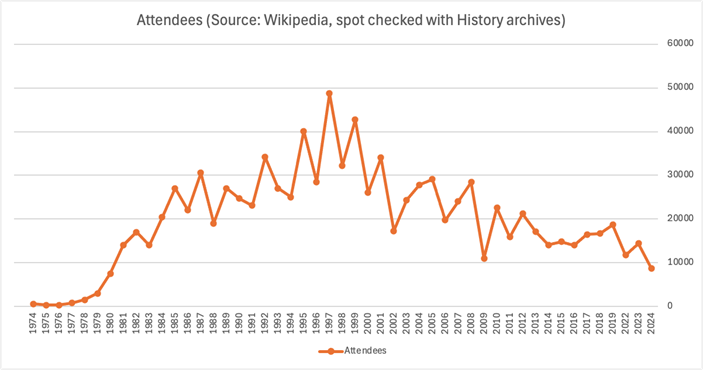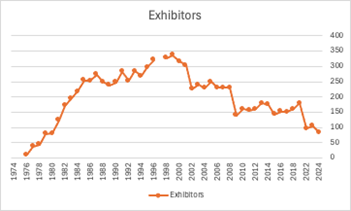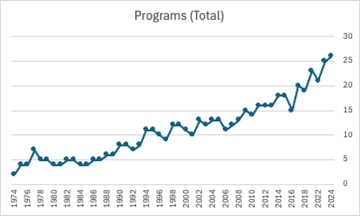We celebrated 50 years of SIGGRAPH in 2023. In its heyday, SIGGRAPH drew almost 50,000 attendees. In our 51st year, we were back in Colorado, where it all began. Attendance was closer to 9000. Given this context, it behooves us to ask some hard questions. Where are we headed? Often, it helps to start by asking “where are we coming from?” I started by looking through our history archives.
The first conference in 1974 had only two types of content: papers and courses. The content was driven by scientific and engineering applications. Human input and interactive techniques were as important as techniques for measurement and representation. One title drew my attention: “Searching for Oil with an Interactive Graphic Terminal”. I appreciated the authenticity and excitement in the first line of the front matter posted by Rob Shiffman: “The conference was a smashing success.”
At this point, the conference was in a growth phase. By 1994, there were 25000 attendees, and in 1997, a record attendance: 48700! In 2004, we were down to approximately 28000 attendees, by 2014, we were down to 14000 attendees and in 2024, somewhere in the neighborhood of 9000 attendees. Graphing these numbers was sobering. In the year 2024, we are somewhere in between the attendee totals of 1980 and 1981 (Figure 1). Our exhibitor numbers are in the same ballpark too (Figure 2). I wondered, if we continue on this trajectory, in six years, will we be where we were in 1974?


That got me curious about the rest of the programs listed on the history archive. While the first conference in 1994 had only two programs, papers and courses, we have since added new programs in an almost linear fashion. In 2024, we had 26 programs listed on our website (Figure 3). These numbers are subject to debate – should Awards be counted as a program, for example – but the trend is clear. Now, I found my mind boggling. I tried listing all the programs we had on offer off the top of my head, and I could not. I asked a few others, just as a fun challenge, and they could not either.

I recently saw the film Koyaanisqatsi. An indie film made in 1982, the tagline said, “Life out of Balance”. The film has no dialogue or narration, only visuals set to a musical score. In the year 2000, it was selected for preservation in the United States National Film Registry in the Library of Congress. A visual from the film sprang into my mind: crowds of people walking briskly in various settings ranging from train stations to streets, no time to soak in the wonders of the world. I cannot convey in words what was so masterfully conveyed in that film. But I can ask: how could any of us find the time to enjoy even half of the programs we offer in the space of the annual conference? In a five-day conference, even if I try to catch two programs a day, that’s only ten programs that I can sample. And I call it sample for a reason – an attendee would only be able to catch two technical paper sessions in a half day of attending that particular program, for example.
And so, I found myself wondering again: Have we spread ourselves too thin? Is it time to go back to our roots? And if so, what are they?